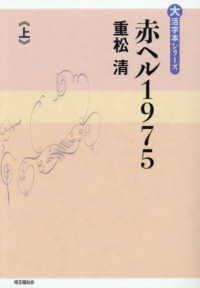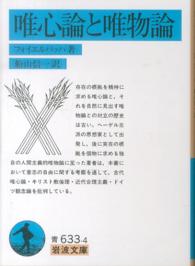- ホーム
- > 洋書
- > ドイツ書
- > Humanities, Arts & Music
- > Linguistics
- > english linguistics
Description
(Text)
An introduction to academic skills which leaves nothing to be desired - designed for students of English and American Studies, this companion will guide you through research, presentation, quoting and style, as well as the composition of essays and term papers. Acquiring these competences will not only equip you for the expectations of university studies but will also enhance your communication skills and promote your ability to think critically and independently. The book is rounded off by strategies for exam preparation and plenty of practice exercises complete with solutions.
(Short description)
An introduction to academic skills which leaves nothing to be desired - designed for students of English and American Studies, this companion will guide you through research, presentation, quoting and style, as well as the composition of essays and term papers. The book is rounded off by strategies for exam preparation and plenty of practice exercises complete with solutions.
(Table of content)
Preface: How to be Curious9Chapter 1: Down the Rabbit Hole: Managing Your Studies15Exercises20Chapter 2: Finding a Topic232.1 Phrasing Your Topic242.2 Topic Development252.3 Alternative Methods of Topic Development28Exercises31Chapter 3: Research333.1 "Secondary Literature"333.2 Library Catalogues343.3 Bibliographies and Databases353.4 Local Libraries383.5 Using Search Engines and Websites in Academia393.6 Checklist: Academic Internet Sources423.7 Are Online Sources 'Less Acceptable' Than Others?443.8 What You Know - What You Should Know46Exercises 52Chapter 4: Presentation554.1 Your Audience: Example, "A Presentation Gone Wrong"564.2 You614.3 Your Material65Exercises686 Table of Contents Chapter 5: Writing Abstracts715.1 Structure of an Abstract715.2 Example74Exercises76Chapter 6: Academic Texts 796.1 Types of Academic Texts796.2 Evaluating Academic Texts836.3 Text Types in Student Writing85Exercises98Chapter 7: The Little Scriptorium1017.1 Table of Contents - the Skeleton of Your Paper1027.2 Introductions: "Interesting" Topic, but Why?1077.3 Convincing Arguments1157.4 Conclusions in Which Something Is Concluded 1207.5 Language and Style1227.6 Research Papers in Linguistics1237.7 Twelve Common Errors in Research Papers: How to Dig Your Own Grave125Exercises136Chapter 8: Single White Quotation Seeks Same1398.1 Formally Correct Citation1398.2 Documenting Sources in Literary and Cultural Studies1448.3 Documenting Sources in Linguistics1468.4 Using Quotations Efficiently147Exercises150Chapter 9: Preparing the Manuscript1539.1 Why Bother With Style Sheets?1539.2 MLA Style 1579.3 Checklist: Formatting Guidelines at a Glance162Exercises167Chapter 10: Inventing Meatballs: Plagiarism16910.1 How to Invent Meatballs: Giving Credit17210.2 Strategies to Avoid Unintentional Plagiarism 176Exercises179Chapter 11: Strategies for Exams18111.1 Types of Questions in Written Exams18311.2 Exams: DOs and DON'Ts18611.3 Strategies for Essay Questions18911.4 Sample Analysis19111.5 Oral Exams198Exercises202Chapter 12: Out of Sight, Out of Mind? The Art of Giving and Receiving Feedback205Appendix209Solutions209Glossary230Reference Works243






